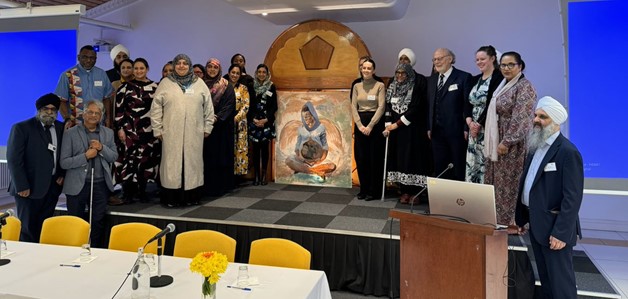Nishkam Healthcare Trust and Nishkam Civic Association were delighted to host a symposium on Start of Life Care on Wednesday 13th and Thursday 14th of March 2024.
A key aim of the symposium, alongside exploring faith-inspired teachings for start of life care and furthering neighbourhood integration, was to discuss findings from Birmingham and Solihull (BSoL) ICB-funded Nishkam Start of Life Care project, which launched in July 2023, and has run four successful cohorts. The Symposium ran over two days, and included interactive panel discussions featuring representatives from BSol ICB, hospital doctors and consultants and community organisations such as Flourish, Bethel Health and Healing Network and Perry Barr NNS, exploring how to better navigate local challenges around start of life care, and looking ahead to future ways of linking services to provide better pre-natal care for mothers, and support for fathers.
Dr Manvir Kaur Kalirai, Chair of Nishkam Healthcare Trust, spoke about the life-long impact of the first 1001 days (from conception to the age of 2 years) a child’s life has on them. She informed that infant mortality is the leading cause of preventable death in West Birmingham, and it is also an indicator of the general health of the population, as well as of standards of clinical care.
Thus, to give children the best start in life we must address health inequalities as well as optimising clinical care. Following Dr Manvir Kaur’s speech, a panel of distinguished speakers from various faiths each had their turn to share the perspectives of their faith on start of life care and its importance.
Dr Gopinder Kaur, who represented the Sikh faith, spoke about how babies serve as a powerful reminder to us of the incredible potential we all possess. The panel also included Dr Bilqees Khwaja, Islamic faith, Dr Manisha Patel, Hindu faith, Reverend Cassius Francis, Christian Faith, and Dr Andrew Goldstein, Jewish faith.
Their diverse perspectives added to the depth of our discussions, allowing attendees to understand the views of different faiths so that better care can be provided for all. Although the speakers shared their differing perspectives about when life begins, they all mentioned the blessing that is the beginning of life and the integral role values play in raising a child.
Speakers from Birmingham and Solihull Mental Health Trust spoke about the critical need for pre-natal mental health support and listed some of the existing referral pathways open to women to seek support. Presently this service is under-utilised in West Birmingham, and the mental health team are keen to work with communities and support women in this pivotal time in their lives.
Dr Satish Rao, Medical Director for Innovation and Transformation, BSol ICB, expressed the need to reimagine the healthcare system to accommodate holistic approaches and wraparound support. Dr Rao also touched on newfound perspectives of working with faith organisations as a result of the success of the Nishkam Start of Life Care project.
Handsworth is home to a super-diverse community, but also sadly has reported some of the more unequal health statistics compared to the rest of Birmingham. There are typically very poor outcomes for mothers and children including high levels of infant mortality, due to low levels of health literacy.
These health inequalities were evident in the Nishkam Start of Life Care project’s cohorts, 369 referrals were carried out for the 69 women who participated in the project, an average of five per participant – the most common referrals being energy redress, essential items for children, food and milk vouchers and maternity grants. The Nishkam Start of Life Care project aims to tackle these inequalities from the ground-up with a vision to work together to nurture good healthy human beings and give every child the best start to life; educating and empowering future parents.
The project’s universal aims have attracted as much support and involvement, with nearly 1300 volunteers hours and 15 health professionals. The healthcare professionals volunteered their space time to deliver the antenatal session, saving the NHS £300 of professional fees. The impact of the project is clear from the feedback – participants gave high praise for the programme, and there was a 64% average improvement of knowledge across the topics from pregnancy, delivery and post-natal care.
A fourth cohort, despite not being in the initial programme’s delivery plan, was run due to high demand. Most notably, in their evaluations, participants expressed a need for further workshops focussing on post-natal core.
On the Symposium, Ajit Singh, Director of the Nishkam Civic Centre, said: “The SOLC pilot project is an excellent example of integrated care, bringing together healthcare, community and faith partners to deliver a programme of seamless antenatal and wraparound support addressing the wider determinants of wellbeing in a culturally appropriate and safe space, infused with an abundance of care and compassion.
“This project strongly aligns with our approach towards prevention and early help to provide babies with the best start of life.” Ranjit Sondhi, Trustee of Nishkam Healthcare Trust and Non-Executive Director of the Black Country Integrated Board added: “We now live in a society where we know the cost of everything and the value of nothing.
“The Nishkam Start of Life Care Pilot Project is an excellent example of integrated care in the neighbourhood, which harnesses the goodwill of communities and health professionals to holistically address the needs of expectant mothers”.











